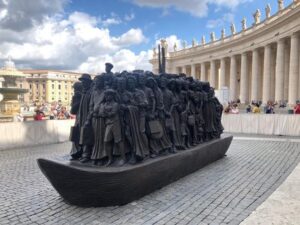JOYFUL GOSPEL LIVING – FEBRUARY 16, 2025
Sixth Sunday in Ordinary Time (Year C)
“Blessed are you…”

Bronze Sculpture “Angels Unaware” by Timothy Schmalz
Installed in St Peter’s Square (Vatican City – Rome, Italy) on September 29, 2019 (105th World Day of Migrants & Refugees)
My parish is very blessed to have a large and active Society of St. Vincent de Paul (SVDP) ministering in our local community. Through the actions of many dedicated volunteers and generous donors, SVDP provides temporary and ongoing assistance to families who experience many challenges with critical food supplies, affordable housing, and basic needs for survival. This ministry is a mutual blessing–to the guests who come for aid and to those volunteers who are a Christ-like presence of solidarity to them..
This weekend, our Scripture readings remind us that we are called to live a God-centered life. When we completely place our trust in God, we are truly alive. Our daily experiences are transformed because we see things differently. We become aware of the blessings in our midst. This awareness then fills us with gratitude while re-ordering what we value in life.
Because we are in the liturgical cycle of the Gospel of St. Luke, Jesus offers us four blessings (“Be-Attitudes”) and four woes in this weekend’s Gospel, promising that those who are poor, hungry, weeping, hated, and insulted will rejoice and be glad. God notices those people with great love and attention, and He bestows blessings upon them. Alternatively, the woes are a caution for those who may not be paying attention to the needs around them.
The Beatitudes are the blueprint for the Church’s teachings on social justice. There are seven themes to Catholic Social Teaching, all based on the Church’s understanding of human life and human dignity. They play a central role in shaping pastoral priorities throughout the Church—for the rich and the poor alike.
On February 20th, the United Nations will mark the World Day of Social Justice. The United States Conference of Catholic Bishops (USCCB) has 19 committees that carry out specific mandates in support of its spiritual goals. One of those committees is the International Justice and Peace Committee, led by Bishop Elias Zaidan, Bishop of the Maronite Eparchy of Our Lady of Lebanon. This committee, focused on social justice, also has eight other diocesan bishops or auxiliary bishops who support this mission:
“Sharing and promoting the social teachings of the Church, especially on global solidarity, human development, human rights, religious freedom, and war and peace.”
When we meet people who experience great need, whether domestic or international, we are called to act with justice and to care for our neighbors with love and mercy (Hint: This is an ancient and enduring message from the Prophet Micah of the Hebrew Scriptures). Sometimes, Christ’s Gospel can put us into conflict with secular or political agendas. From our baptism, though, our sacramental life in the Church sends us forth as disciples (and prophets) on Christ’s mission to build the Kingdom of God here and now.
A link on the USCCB’s Justice and Peace website calls Catholic disciples on mission to put Two Feet of Love in Action. This program was inspired by two encyclicals of Pope Benedict XVI, with a vision of putting Christian charity into daily practices. What does it mean to put two feet in action? It is a deliberate walk of discipleship:
- Social Justice
Concerns the social, political, and economic aspects and, above all, the structural dimension of problems and their respective solutions” (Compendium of the Social Doctrine of the Church, no. 201). We step with this foot when we work to address the root causes of problems facing our communities by advocating for just public policies and helping to change the social structures that contribute to suffering and injustice at home and around the world.
- Charitable Works
Charitable Works are our “response to immediate needs and specific situations: feeding the hungry, clothing the naked, caring for and healing the sick, visiting those in prison, etc.” (Deus Caritas Est, no. 31). We step with the Charitable Works foot when we work to aid or assist others both locally and globally to meet their immediate needs. Examples include engaging in direct service or providing food, clothing, shelter, or monetary assistance to help those in need.
As we hear Jesus’ teaching this weekend, what can we do to be better disciples? First, we need to become better listeners, but with an attitude of listening to the voice of God rather than other voices that may not embrace the Church’s fundamental teachings. We also need to see the world differently with eyes that look for the concealed needs that are waiting for us to notice. To hear and see differently, it helps to pray regularly for God to bless us with understanding hearts (prayer resource from the USCCB website):
Loving Father, open our hearts to hidden realities:
Your love for all people,
Your presence in the community,
Your call to justice and peace.
May the sacraments stir in us
that same love for those with whom we worship
and all members of our human family.
Christ Jesus, help us to imitate Your example:
healing the sick, welcoming the stranger, assisting the poor and vulnerable.
May the sacraments remind us of Your love and self-giving,
which we strive to imitate.
Holy Spirit, make visible to our eyes what is invisible:
Your call to Your people,
Your summons to live our faith daily as witnesses of justice and peace.
May the sacraments move us to engage in love-inspired action that transforms us and the world.
Amen.
As the Jubilee Year 2025 continues, pilgrims of hope are on a shared journey of solidarity and openness to God’s goodness. The responsorial psalm is a great jubilee reminder of how we can walk with two feet:
“Blessed are they who hope in the Lord.”
Peace and all good,
Teresa S. Redder, OFS
Saint Katharine Drexel Regional Minister
